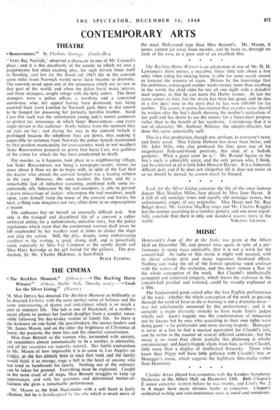THE CINEMA
"Thc Reckless Moment." (Odeon.)—" The Rocking Horse Winner." (Odeon, Marble Arch, Thursday next.)—" Look for the Silver Lining." (Warner.) M. Max OPULS has directed The Reckless Moment as brilliantly as he directed Liehelei. with the same perfect sense of balance and the same interweaving of drama and anti-climax which is so much a part of ordinary life. The tale is one of blackmail, of a mother's secret efforts to protect her foolish daughter from a scandal, mean- while following the day-to-day routine of family life. So there is the darkness on one hand, the pawnbrokers. the money-lenders and Mr. James Mason, and on the other the brightness of Christmas at home, the presents, the store lists and the cheerful conversation. Miss Joan Bennett as the woman who, tormented with anxiety, yet remembers almost automatically to be a mother, is admirable, and all her reactions are superbly natural. Her feeble explanation to Mr. Mason of how impossible it is to come to Los Angeles on Friday, as she has already been in once that week and the family would think it so strange, rings a bell in the heart of anyone who has tried to bamboozle his family. Nothing out of the ordinary can be taken for granted. Everything must be explained. Caught in the most cruel of all traps, Miss Bennett struggles to keep up appearances, and with her quietness and determined matter-of- factness she gives a remarkable performance.
Mr. Mason as the Irish blackmailer with a soft heart is fairly effective, but he is handicapied by his role which is much more of
the stock Hollywood type than Miss Bennett's. Mr. Mason, it seems, cannot get away from murder, and he leads us, through no fault of his own, to a poor end of an excellent film.
The Rocking Horse Winner is an adaptation of one of Mr. D. H. Lawrence's short stories, a macabre, bitter little tale about a boy who, when riding his rocking horse, is able for some occult reason to forecast the winners of races. Driven by the knowledge that his ambitious, extravagant mother wants money more than anything in the world, the child rides his toy all one night with a dreadful mad urgency so that he can name the Derby winner. At last the name comes to him, but the strain has been too great, and he dies in a few days' lime to the news that he has won £80,000 for his mother. The censor, it seems, has insisted that an extra scene should be written after the boy's death showing the mother's realisation of her guilt and her desire to use the money for a benevolent purpose rather than to the benefit of her wardrobe. Considering that it is out of character, Mr. Anthony Pelissier, the adapter-director, has done this scene remarkably well.
This is a fine production, though not, perhaps, to everyone's taste, and finely acted. Miss Valerie Hobson has never been better, and Mr. John Mills, who also produced the film, gives one of his magnificent flesh-and-blood portraits, this time of a Suffolk gardener. What a great actor he is ! Mr. Ronald Squire as the boy's uncle is admirably suave, and the only person who. I think, can be criticised at all is little John Howard Davies. It is a hideously difficult part, and if he does not altogether fill it, does not move us as we should be moved, he cannot much be blamed.
Look for the Silver Lining concerns the life of the once famous dancer Miss Marilyn Miller, here played by Miss June Haver. It it full of old nostalgic tunes and equally old nostalgic names, but unfortunately empty of any originality. Miss Haver and Mr. Ray Bolger dance, Mr. Gordon MacRae sings and Mr. Charles Ruggles has the mumps according to a familiar pattern, and one must regret- fully conclude that there is only one standard success story in the


































 Previous page
Previous page